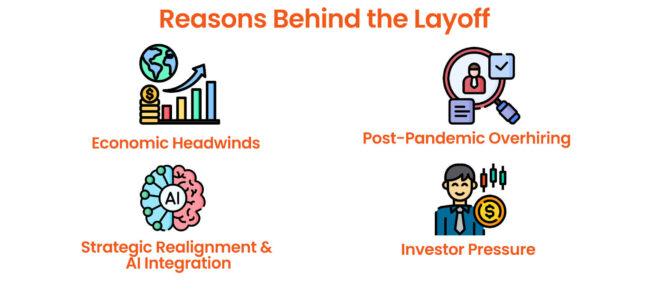How Layoffs Are Redefining Tech Hiring in 2025
The tech industry, once seen as an unstoppable engine of growth, is in the midst of an unprecedented recalibration in 2025. Waves of layoffs, particularly impacting the United States and rippling across the globe, are not just passing events; they are fundamentally reshaping the landscape of talent acquisition. This isn’t merely a market correction; it’s a strategic imperative that demands a fresh approach to how companies acquire and manage their most valuable asset: human capital.
The Seismic Shift: What’s Really Happening in Tech Layoffs?
Throughout 2024 and continuing into 2025, major tech giants like Microsoft, Google, Amazon, Intel, and Meta have announced significant workforce reductions. While specific, exact figures for “100,000 tech jobs in 2025 alone” are dynamic and constantly updated, reputable sources consistently report ongoing, large-scale layoffs across the industry. For instance, Crunchbase News regularly tracks and reports on tech layoffs, providing ongoing data on the thousands of jobs being cut across various companies (Crunchbase News – Tech Layoffs Tracker).
Reasons Behind the Layoff Storm:
- Persistent inflation, rising interest rates, and a tightening of venture capital funding have pressured companies to prioritize profitability and efficiency over aggressive expansion. Reports from the Federal Reserve and analysis by financial news giants like The Wall Street Journal consistently highlight these macroeconomic pressures impacting corporate spending and hiring decisions (The Wall Street Journal – Economy).
- The rapid acceleration of digital transformation during the pandemic led to aggressive hiring sprees. As user behavior normalizes and economic realities set in, many companies find themselves overstaffed. This trend has been widely discussed by business analysts on platforms like CNBC and Forbes
- This is arguably the most significant long-term driver. Companies are investing billions in AI, automation, and cloud infrastructure. Roles that are repetitive, easily automated, or do not align with new AI-first strategies are being phased out. For example, Microsoft’s substantial investments in AI and its directive for employees to “invest in your own AI skilling” underscore a shift where AI usage is becoming “core to every role” (The New York Times – Tech Section frequently covers these shifts in major tech company strategies). Furthermore, reports of companies like IBM replacing some roles with AI automation, particularly in areas like HR, point to a broader trend where AI is taking over routine tasks.
With slower growth, investors are demanding leaner operations and higher returns, pushing companies to reduce headcount as a primary cost-cutting measure. Financial reports and investor calls, often summarized by outlets like Bloomberg Markets and Seeking Alpha, reflect this pressure on tech companies to optimize costs.

This turbulent environment is impacting workers across all levels and geographies, forcing both employers and job seekers to adapt to a new reality.
The AI Imperative: Will AI Replace Developers?
The rise of AI is undeniable, and its impact on tech roles is a hot topic. While AI is dramatically augmenting many aspects of software development – with some reports indicating AI now generates a significant percentage of all code ([various tech industry reports and analyst firms like Gartner and Forrester frequently publish statistics on AI’s role in code generation]) – the consensus among leaders like Bill Gates and Salesforce CEO Marc Benioff is that AI will augment rather than replace most white-collar tech jobs, especially those requiring complex problem-solving and creativity.
For developers and development managers, AI will likely reshape their roles rather than eliminate them:
For Developers:
- AI tools will automate repetitive coding tasks, allowing developers to focus more on complex logic, architecture, and problem-solving.
- They’ll shift from writing boilerplate code to reviewing, refining, and optimizing AI-generated suggestions.
- Developers will need to build skills in prompt engineering, model fine-tuning, and AI integration within applications.
- There will be an increasing demand for developers who can collaborate with AI systems effectively and understand their limitations.
For Development Managers:
- Automation of Routine Tasks: AI tools can assist with resource allocation, project tracking, sprint planning, and even performance monitoring by analyzing data, freeing managers for higher-level strategic work.
- Focus on Human Elements: Managers will increasingly focus on team motivation, mentorship, conflict resolution, fostering innovation, and navigating complex human dynamics that AI cannot replicate.
- Strategic Vision & AI Integration: Dev managers will need to understand how to best leverage AI tools within their teams, guide their adoption, and ensure ethical considerations are met.
Ultimately, developers and dev managers who embrace AI as a powerful co-pilot, rather than fearing it, will thrive.
The Remote Work Advantage: Scaling Flexibly in a Volatile World
The traditional recruitment model, characterized by slow processes, local limitations, and rigid structures, is ill-equipped for the current market volatility. Layoffs highlight its fundamental flaws:
- Slow & Inflexible: Traditional hiring takes months, making rapid scaling up or down nearly impossible without significant disruption. Layoffs, in particular, damage employer reputation and make it harder to attract and retain top talent, who prioritize stability.
- Costly & Geographically Limited: Maintaining large physical offices and limiting talent searches to expensive local markets adds unnecessary overhead and restricts access to diverse, specialized skill sets.
This is where remote hiring emerges as the strategic imperative for 2025:
- Speed & Global Talent Access: Remote hiring platforms leverage pre-vetted talent pools and streamlined processes, allowing companies to onboard skilled developers in days or weeks, not months. The “best” talent is no longer confined by geography.
- Cost-Effectiveness: By tapping into talent in regions with lower costs of living, companies can significantly reduce salary expenditures while maintaining high quality, optimizing their budget for strategic investments.
- Unmatched Flexibility & Scalability: This is critical in an era of unpredictable market shifts. Global hiring platforms allow for truly flexible engagement models:
- Hire developers on-demand through pay-by-the-hour contract models for specific projects, MVPs, or to manage fluctuating workloads.
- Hire full-time employees through Employer of Record (EOR) services, which handle all local payroll, taxes, benefits, and compliance in the developer’s home country. This means you gain a dedicated full-time team member without needing to establish a legal entity in that country, simplifying global expansion immensely.
- The ability to seamlessly switch between these models based on project requirements gives companies unprecedented control over their workforce and budget. You can scale up rapidly for new initiatives and, critically, scale down efficiently without the complex severance payouts and reputational damage associated with traditional layoffs.
How Developers Benefit from Remote Work
For individual developers, the rise of remote work also presents significant advantages:
- Expanded Opportunities: No longer limited to local job markets, developers can access a wider array of roles at companies worldwide, including those that might not have existed in their immediate vicinity.
- Improved Work-Life Balance: The flexibility of remote work often translates to better management of personal commitments, reduced commute times, and the ability to work from an environment conducive to productivity.
- Diverse Project Exposure: Remote roles can offer opportunities to work on cutting-edge projects for innovative companies that might otherwise be geographically inaccessible.
- Competitive Compensation (Globally): Developers in regions with lower costs of living can secure higher-than-local salaries by working for companies in higher-paying markets, improving their quality of life.
- Focus on Output: Remote work often shifts the emphasis from “time spent in the office” to “results delivered,” empowering developers with greater autonomy and accountability.
eDev’s Role: Partnering for Agile Growth and Talent Retention
In this redefined landscape, eDev stands as a crucial partner for companies seeking to navigate the complexities of modern tech hiring. We understand that in 2025, it’s not just about hiring; it’s about strategic talent acquisition and management.
Our founders, having been integral parts of multiple successful startups, deeply understand the need for speed, cost-effectiveness, and flexibility. This firsthand experience fueled the creation of eDev: to help tech companies hire the top talent, scale flexibly, and retain the best talent even amidst market volatility.
- Sourcing the Best Talent: We leverage our expertise and network to identify, vet, and hire top-tier developers from talent-rich emerging markets globally, cutting your sourcing time from months to days.
- Streamlined Hiring & Onboarding: Our platform takes care of rigorous candidate vetting, seamless onboarding, secure payments, HR & admin support, and full compliance across borders.
- Unparalleled Flexibility: Through our pay-by-the-hour contract model and EOR services, you gain the power to scale your teams up or down on demand, adapting to market shifts without the pitfalls of traditional hiring. This flexible approach is key to talent retention, as developers often seek companies that offer stability through agile scaling, rather than sudden, large-scale layoffs.
- Performance Tracking & Retention: We provide tools and support to ensure transparent performance tracking, fostering a productive and engaged remote workforce, which is vital for retaining top talent in a competitive environment.
The tech layoffs of 2025 are a powerful catalyst, driving companies to fundamentally rethink their hiring strategies. The era of rigid, locally constrained, and expensive recruitment is giving way to a more agile, global, and flexible model. Embracing remote hiring is no longer a luxury but a strategic imperative for sustainable growth and resilience. By partnering with platforms like eDev, companies can harness the power of global talent, achieve unprecedented flexibility, and build robust, adaptive teams that are ready to thrive in the ever-evolving tech landscape.





























